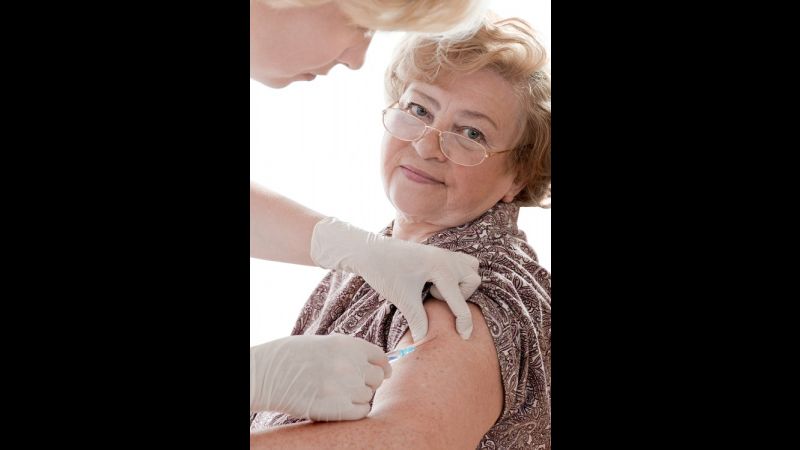August symbolizes the end of summer, but did you know that it’s also National Immunization Month? Vaccines have helped protect thousands of lives, but some may still be skeptical about the necessity and safety of elderly vaccines. To help ease some of your concerns, we’ve answered the most frequently asked questions about the recommended vaccines for seniors.
Influenza (Flu) Vaccine
Why do seniors need this vaccine?
The importance of the flu shot for seniors cannot be underestimated! As we age, our immune system weakens, making us more susceptible to flu-related complications. Your risk of getting the flu also increases if you suffer from certain chronic conditions, like diabetes or heart disease.
According to the National Council on Aging, seniors make up between 50 and 60 percent of flu-related hospitalizations and 90 percent of flu-related deaths.
How safe is the flu shot for seniors?
The flu shot is completely safe for people of all ages. You cannot get influenza from the vaccine since it does not contain the live virus. Another common concern is the side effects of the flu shot, but these are minor. A little soreness and swelling on the spot where the vaccine was injected can occur, and it is completely normal. You may also experience fatigue, muscle aches or a slight fever.
When is the best time to get the flu shot?
It’s best to get your annual flu shot right at the beginning of the flu season (around October), but it’s never too late in the season to get vaccinated. You can get a flu shot at your doctor’s office, a retail store or clinic. As an added bonus, Medicare covers the cost with no co-pay.
Shingles Vaccine
Why is the shingles vaccine so important for seniors?
Out of the estimated one million Americans who develop shingles every year, about 50 percent of them are seniors, according to WebMd. Shingles can cause a painful, blistering rash, chills, a headache, an upset stomach and, in some cases, long-term nerve damage.
The good news is that you only need to receive this vaccine once in order to prevent this common yet painful skin disease. The vaccine lowers your risk of getting shingles by 51 percent and your risk of nerve damage by 67 percent.
What are the shingles vaccine side effects, if any?
Common shingles vaccine side effects include redness, swelling, itchiness, pain or tenderness where the vaccine was injected.
There are some people, however, who should not get this vaccine. If you’re allergic to gelatin or neomycin or have a medical condition, speak with your doctor first before getting vaccinated for the shingles virus.
How is shingles related to the chickenpox?
Shingles is caused by varicella, the same virus that causes the chickenpox. Once you’ve had the chickenpox, the virus stays in your body and can come back as shingles at any point, usually after the age of 50. Unlike the chickenpox, you can get shingles multiple times, but the vaccine will help you stay protected.
TDAP Vaccine
What does TDAP stand for?
The TDAP vaccine is a 3-for-1 shot that protects you against these three very serious diseases:
- Although it’s rare in the United States today, tetanus tightens the muscles in the head and neck, making it hard to swallow and breathe.
- Another rare disease, diphtheria causes a thick coating to develop in the back of the throat, leading to breathing problems, paralysis, heart failure and death.
- More commonly known as whooping cough, pertussis results in severe coughing spells.
The TDAP vaccine should be received once, and a tetanus and diphtheria (Td) booster vaccine is needed every 10 years. Although these three diseases are uncommon today, they were once popular enough to threaten the lives of seniors, so it’s better to get vaccinated than risk a potential health threat.
Pneumococcal Vaccine
Why is the pneumococcal vaccine necessary?
Pneumococcal disease causes pneumonia, meningitis and bloodstream infections, killing 18,000 seniors every year. That’s why it’s recommended that all adults who are 65 years and older receive both the PCV13 and PPSV23 vaccines.
Even if you are younger than 65, you may also need to be vaccinated if you have a chronic health condition. Speak with your doctor to find out if this vaccine is recommended for you.
Boosting Your Health
The elderly vaccines above are all essential, but this is certainly not an exhaustive list. Vaccines really do help you live the healthiest life possible, but discuss them with your doctor first to learn if a vaccine is right for you depending on your age and health conditions.
It’s also worth noting that many of these vaccines are recommended for new grandparents who are planning on spending a lot of time around newborns. Don’t be surprised if your son or daughter request that you be vaccinated before spending time with their baby!
Even if you keep your vaccines up to date, it’s not impossible to fall ill during the winter, which is a high time for sickness. Investing in a medical alert system from Medical Guardian can ensure that you will have access to help should you need it. No one should have to suffer through an illness alone.


